General
Save the Date! CLARIN Annual Conference 2022 (CLARIN2022)
10-12 October 2022
In 2020 and 2021, the CLARIN Annual Conference took place virtually. In 2022, we hope to at least partially return to the traditional format, with Prague, Czechia, as the venue. The event will be organised by CLARIN in collaboration with LINDAT/CLARIAH-CZ.
The CLARIN Annual Conference 2022 (CLARIN2022) programme will include keynotes, papers, posters and demos. The diversity of the conference programme encourages discussion on up-and-coming topics that are relevant for the CLARIN community in the context of the European infrastructural landscape and research trends. CLARIN2022 is the main annual event to connect those working on the construction and operation of CLARIN across Europe, as well as researchers in the humanities and social sciences.
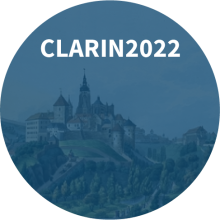
CLARIN2021: Materials Now Available
The following materials are now available online:
- YouTube playlist with the recordings of CLARIN2021
- Presentations and slides; check the conference programme page
- An enriched information page as background for the CLARIN2021 panel
- Full abstracts, check the CLARIN2021 conference proceedings
- CLARIN2021 summary (cartoon-style).
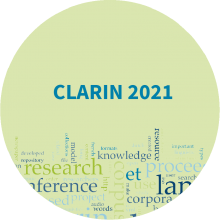
B-Centre Re-Certification of TalkBank
We are pleased to announce that TalkBank CLARIN Knowledge Centre at Carnegie Mellon University (Pennsylvania, USA) has been successfully re-assessed as a CLARIN B-centre and has received a renewed B-centre certificate.
TalkBank is a project coordinated by Professor Brian MacWhinney, and is hosted at Carnegie Mellon University (Pittsburgh, Pennsylvania). TalkBank’s goal is to promote and enable research on human communication, with a specific focus on the cognitive, neurological, developmental, and social underpinnings of language processing. To this end, TalkBank provides (spoken) language resources for researchers and clinicians interested in communication. Hundreds of researchers have contributed to the data in TalkBank, and its resources span 34 languages. Currently, TalkBank provides repositories in 14 research areas.
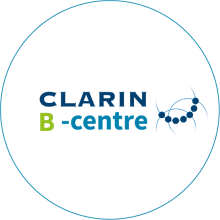
Tour de CLARIN: Knowledge Centre for South Slavic Languages
This month, Tour de CLARIN presents the CLARIN Knowledge Centre for South Slavic Languages (CLASSLA), which offers support for automated processing of South Slavic languages, and is operated by the Slovene CLARIN.SI, and the Bulgarian CLaDA-BG.
CLASSLA recognizes the need for the development of language resources and technologies not only for Slovene and Bulgarian, but also for the other under-resourced South Slavic languages. That is why the centre aims to support researchers from the fields of computational and corpus linguistics, digital humanities, as well as interested individuals from other scientific and business areas that use and produce language data for Slovene, Croatian, Serbian, Bosnian, Montenegrin, Macedonian, and Bulgarian.
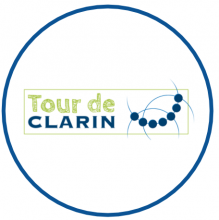
CLARIN Resource Families: Glossaries
The CLARIN Resource Families provide a user-friendly overview of the available language resources in the CLARIN infrastructure for researchers from the digital humanities, social sciences and human language technologies.
This month, CLARIN highlights: Glossaries. Glossaries are specialised dictionaries for domain-specific terminology and expressions.
There are 32 glossaries in the CLARIN infrastructure. Most are multilingual (22), accounting for 14 language combinations, while the remaining ones are monolingual (10), accounting for 6 languages. In the majority of cases, the glossaries can be directly downloaded from the national repositories or queried through easy-to-use online search environments.
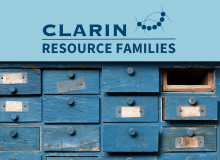
Updates from the National Consortia
’Privacy in Research: Asking the Right Questions’ Project Awarded a Commendation by Council of Europe
The project ‘Privacy in Research: Asking the Right Questions’ has been awarded a commendation by the Council of Europe Platform on Ethics, Transparency and Integrity. Esther Hoorn, the project leader, will present the project at the award conference, which will be held on the morning of 7 December at the Council of Europe in Strasbourg, as well as online.
The project has the following goals:
- Teach students how to ask the right questions about the privacy of stakeholders by helping them to look at privacy issues from different perspectives (researcher, subject, legal expert, IT expert, etc.)
- Develop an approach for successfully designing, implementing and embedding responsible research methodology in multi/interdisciplinary research.
As part of the project, the following items have been developed: an online course, a film, case studies, and a role-play game.
Call for Papers: Machine Learning and Data Mining for Digital Scholarly Editions
9-10 June 2022, University of Rostock, Germany
The call for papers for the conference ‘Machine Learning and Data Mining for Digital Scholarly Editions’, organised by the Institute of Documentology and Editing (IDE), is now open.
Data mining and machine learning techniques are increasingly used in many areas of the digital humanities, for example processing and extracting information from digital images or for analysing full texts representing humanities sources. Machine learning and data mining methods are also already being used in the field of digital editing, notably for text recognition, comparing textual witnesses or enriching texts with linguistic or semantic information. The aim of the conference is to discuss existing approaches to the use of machine learning and data mining in the workflow of digital editing, to reflect on them and to think about possible future applications.
Deadline for submissions: 10 February 2022.
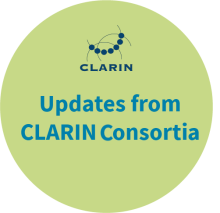
Blogs
CLARIN Café: Text and Data Mining Exceptions in the Directive on Copyright in the Digital Single Market
Read all about the virtual CLARIN Café that took place on 28 October 2021, this time organised by the CLARIN Legal and Ethical Issues Committee (CLIC).
The Café was attended by 25 participants, including language researchers and legal experts from both CLARIN institutions and the private sector. The aim of the event was to discuss the recent reform of EU copyright law, and its impact on language resources and language technology in selected EU member states. It featured presentations by Paweł Kamocki, chair of CLIC and legal expert from IDS Mannheim, and Jan Hajič, professor of computational linguistics and experienced language data manager from Charles University, Prague. Three members of CLIC — Walter Scholger (Austria), Giuseppe Versaci (Italy) and Mateja Jemec Tomazin (Slovenia) — also provided brief contributions regarding the situation in their countries. The event was moderated by Vanessa Hannesschläger, vice chair of the CLIC committee.
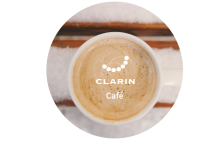
A Recap on the Workshop on Data Management for FAIR CMC Corpora
Read all about the workshop on Data Management for FAIR CMC Corpora that took place on 27 October organised in association with the 8th Conference on CMC and Social Media Corpora for the Humanities (cmccorpora21) that took place in hybrid form, virtually and in Nijmegen, the Netherlands on 28-29 October. The workshop was organised by the recently established CLARIN K-Centre for Computer-Mediated Communication and Social Media Corpora (CKCMC) with support from CLARIN-ERIC.
Read more https://www.clarin.eu/blog/recap-workshop-data-management-fair-cmc-corpora
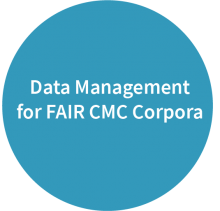
Digital Scholarship in the Humanities Journal Publishes Special Issue on DH2019 Conference
The Digital Scholarship in the Humanities Journal (DSH) has published a special issue on the Digital Humanities Conference of 2019 (DH2019), the annual conference of the Alliance of Digital Humanities Organizations (ADHO). DH2019 was held in Utrecht, the Netherlands. The ADHO program committee was chaired by Fabio Ciotti and Elena Pierazzo, while the local organising committee was chaired by Joris van Eijnatten (Utrecht University) and Franciska de Jong (CLARIN ERIC).
The theme of DH2019 was ‘Complexities’, a theme inherently connected to the core of digital humanities scholarship: building complex models of complex objects and phenomena, analysing them with complex computational methods, and communicating the results to the broader public in a complex multimodal networked environment. The theme also invites people to think about the theoretical, social, and cultural complexity and diversity in which digital humanities scholarship is immersed, and encourages our community to use the conference and other networks in order to interact with institutions and enterprises interested in digital humanities research. Finally, the theme of complexity means involving the next generation by teaching digital humanities approaches to students — the people who will need to deal with the complexities of the future.
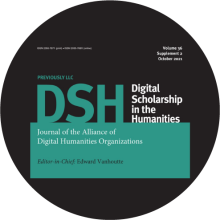
Training and Education
CLARIN2021: Teaching with CLARIN Award
Darja Fišer and Kristina Pahor de Maiti, Mietta Lennes, and Diana Maynard are the winners of the 2021 Teaching with CLARIN Award.
Darja, Kristina and Mietta were awarded the ‘Teaching with CLARIN’ Jury Award for their contribution to this year’s call and for their long-standing commitment to and involvement in CLARIN educational activities. The winners of this award have been selected by a jury consisting of five representatives from the CLARIN Training Taskforce, the Board of Directors and the User Involvement Committee.
Diana Maynard was awarded the ‘Teaching with CLARIN’ Audience Award. The winner of this award has been selected through an open vote during the CLARIN Annual Conference.
All the training materials submitted between December 2020 and June 2021 are showcased in the ‘Teaching with CLARIN’ section of our website.
Read more https://www.clarin.eu/content/teaching-clarin
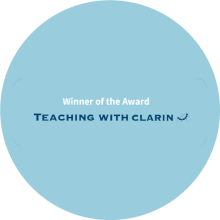
Progress of Erasmus+ Strategic Partnership UPSKILLS
The UPSKILLS project is an Erasmus+ Strategic Partnership for higher education that seeks to identify and tackle the gaps and mismatches in skills for linguistics and language students with a view to enhancing their employability prospects. Recognising the ongoing boom in the use of digital technologies in the labour market, the UPSKILLS consortium plans to develop a new modular curriculum component that can be embedded in existing programmes of study.
The first stage of the project included a detailed needs analysis, in which a team of researchers surveyed the academic literature on the subject, courses offered by language and linguistics curricula across Europe, current job positions for graduates of language and linguistics degrees in the market, and expectations of prospective employers in the language sector. The results of this analysis were presented on 25 June 2021, in the first outreach event entitled ‘Every time I hire a linguist…’. The event included presentations and discussions by representatives from the European Commission’s Directorate-General for Translation, the language industry, research centres, as well as staff and students from two Erasmus Mundus Master’s degrees integrating languages and technology.
An account of the event with accompanying videos can be found here.
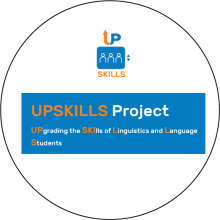
Watch This!
CLARIN2021: Keynote by Elena González-Blanco
Watch the keynote by Elena González-Blanco on ‘Language Technologies Beyond Research: From Poetry to Music Industry’. This session took place on 28 September during the second day of CLARIN2021. For more detailed information and slides please visit the CLARIN2021 programme page.
Events and Calls
Registration Open for CLARIN Café ‘Towards Guidelines for Integrating CLARIN into Teaching - Lessons Learnt from UPSKILLS’
1 December 2021, 14:00-16:00 CET (virtual event)
Registration for the CLARIN Café ‘Towards Guidelines for Integrating CLARIN into Teaching - Lessons Learnt from UPSKILLS’ is now open.
The main goal of this Café is to continue the discussions started at the CLARIN@Universities workshop on the role of the humanities infrastructures in training and education, and to present to the audience the preliminary results of the Erasmus+ UPSKILLS project. The UPSKILLS project aims to upgrade the skills of students from language-related subjects, as well as develop best practices and guidelines for research-based teaching, including the use of the CLARIN infrastructure for data collection, processing and archiving.

The CMDI Sessions - Session #2: Vocabularies for CMDI
14 December 2021at 14:00 (virtual event)
CLARIN organises a series of informal virtual sessions (bring your own coffee) about metadata in our infrastructure: The Sessions.
The second session in this series will take place on 14 December 2021 at 14:00 CET and will focus on the topic of vocabularies for CMDI. There will be a couple of short presentations and plenty of time after that to discuss the topic of the session.
The sessions are not intended as an introduction to CMDI, but everyone is welcome to attend and join the discussions, regardless of their level of knowledge, experience or involvement with metadata in CLARIN. You are more than welcome to bring in your own related topics or questions! You can find more information and a registration link at the event page.
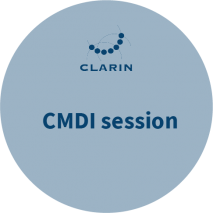
Call for the CLS INFRA Fellowship Programme Now Open
The Computational Literary Studies (CLS) INFRA Fellowship Programme provides access to a wide range of data, tools and knowledge. Scholars from literary studies or those with an interest in computational literary studies methods are invited to apply for a fellowship grant at one of our infrastructure providers. Successful applicants will not only obtain free-of-charge physical access to the infrastructure, but in the context of the overall project, they will become part of the larger CLS community.
Fellowships grants will cover housing and living costs, as well as travel to and from the host institution. The CLS INFRA Fellowships are funded by the European Union under the rules of transnational access. DARIAH ERIC is leading this Transnational Access Fellowship Programme (TNA) and is responsible for the management and oversight of the TNA selection process.
Calls for fellowship grants will be launched twice a year for a total of six calls.The first call will be open from Monday, 1 November 2021, to Monday, 6 December 2021.
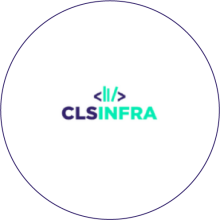
SSHOC Workshop: FAIR SSH Data Citation
3 December 2021, 14:00-15:00 (virtual event)
Data citation in the social sciences and humanities (SSH) can be a rather complicated task. The SSHOC project has identified the development of citation and persistent identification practices for the SSH as one its specific aims. CLARIN has participated in events such as the Data-Citation in Practice Workshop and the Round Table of Experts on Data Citation, which showed that using Persistent Identifiers (PIDs) for data-citation is already well advanced. However, challenges remain, including the incompleteness of existing citation methods and their machine actionability. To address this problem, and as a follow-up to the SSHOC project’s inventory of citation practices, work is being carried out to create recommendations and software to make SSH datasets citable, visualise and exploit citations, and to provide facilities for the curation and semantic annotation of these resources.
Recently, the Linguistics Data Interest Group (LDIG), a working group in the Research Data Alliance ( ), has also started a campaign to encourage the use of data citation in linguistic research papers. CLARIN supports this initiative, which also complements the work of SSHOC.
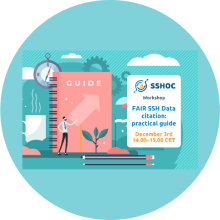
DH Benelux 2022: RE-MIX. Creation and Alteration in DH - Call for Papers
1-3 June 2022, University of Luxembourg (hybrid event)
The annual DH Benelux conference serves as a platform for the community of interdisciplinary digital humanities researchers to meet, present and discuss their latest research findings and to demonstrate tools and projects.
Submissions of abstracts on any aspect of digital humanities are welcomed, including practical experimentation, theorising, cross- and multidisciplinary work, and new and relevant developments. This year, the conference’s central theme is ‘RE-MIX: creation and alteration in DH’ (alluding to the theme of the European Capital of Culture, Esch-sur-Alzette). Of particular interest are contributions that consider the use, re-use, revision/alteration and diffusion/dissemination of ideas, cultural artefacts and/or data.
The call is open to all colleagues working in the arts & humanities, the (social) sciences, and the heritage sector with an interest in the application and use of digital technologies. Submissions are welcome from researchers at all career stages. In addition, humanities scholars, developers, computer and information scientists as well as art galleries, librarians, archivists and museum curators ( ) are welcomed to submit.
Deadline for submitting abstracts: Friday, 4 February 2022 (23:59 CET).
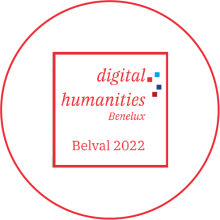
Job Openings
Researcher with Scientific Programming Expertise
Institute for Applied Linguistics, Eurac Research, Bolzano, Italy
The Institute for Applied Linguistics at Eurac Research is looking for a researcher in computational linguistics with scientific programming expertise to implement and adapt software of interest for the IAL so as to support the needs in terms of selecting, installing and adapting tools to explore and annotate textual data or to process text data for linguistic purposes using well-established libraries.
Deadline for applications: 30 November 2021.
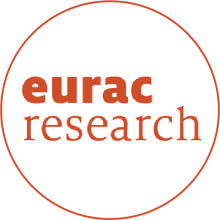
Full-Time Tenure Track Position in Translation and Interpreting Technology
Research Unit Translation Studies, Faculty of Arts, KU Leuven, Leuven, Belgium
The Research Unit Translation Studies of the Faculty of Arts at KU Leuven has a vacancy for a full-time tenure-track position in translation or interpreting technology. KU Leuven seeks applications from internationally oriented candidates with outstanding didactic skills and an excellent track record in research. The appointment starts on 1 October 2022.